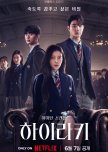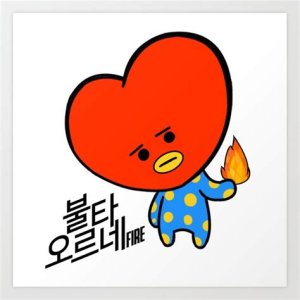
Deze recentie kan spoilers bevatten
A Bland Blend of High School Drama and Unfulfilled Revenge
"Hierarchy" initially promises an intriguing blend of mystery, high school drama, and intricate character dynamics but ultimately falls short of its potential. The series struggles with pacing issues, lackluster character development, and a revenge plot that never fully comes to fruition.One of the most significant issues with this drama is its inability to establish a clear identity. It attempts to blend elements from popular series like "Elite" with traditional kdrama tropes, but the execution is inconsistent. The show's tone oscillates between dark, gritty drama and lighter, more conventional high school scenes, creating a jarring viewing experience.
The central revenge plot, which could have been the driving force of the series, takes a backseat to less compelling storylines. Kang Ha's quest to uncover the truth behind his brother In-han's death is diluted by subplots involving superficial high school romances and power struggles that lack depth. Instead of focusing on the core mystery and building tension around it, the series meanders through trivial conflicts and repetitive interactions.
Character development is another area where this drama falters. The main leads, particularly Kang Ha and Jae-i, fail to evoke empathy or investment from the audience. Kang Ha, despite being positioned as the protagonist, is bland and one dimensional. His motivations are unclear, and his actions often feel inconsistent with his character. Jae-i, who is supposed to be a complex, conflicted figure, comes across as cold and detached. Her chemistry with Kang Ha is almost nonexistent, making their romantic scenes awkward and unconvincing.
Ri-an, another central character, shows some growth over the series, but his arc is not enough to salvage the show. His character's transformation from a typical bad boy to someone seeking redemption is poorly executed, and the final episodes' attempt to humanize him feels rushed and unearned. He-ra, on the other hand, stands out slightly better due to her strong performance, but even her character suffers from inconsistent writing and a lack of clear direction.
The supporting characters, who could have added layers to the narrative, are underutilized and poorly fleshed out. They serve more as plot devices than as integral parts of the story. This lack of depth makes it difficult to care about their fates or understand their motivations.
The show's pacing is another major flaw. The episodes are often padded with unnecessary scenes that do little to advance the plot or develop the characters. Key revelations and twists are either shown too early or dropped without sufficient buildup, resulting in a lack of suspense and engagement.
Visually, this drama has some redeeming qualities. The cinematography and production design are polished, capturing the opulence of Jooshin High and its surroundings effectively. However, good visuals alone cannot compensate for the weak narrative and character flaws.
The final episode attempts to wrap up the numerous plot threads but ends up feeling anticlimactic. The revelation of the true events behind In-han's death is predictable and lacks impact. The post-credit scene, intended as a cliffhanger, feels more like a desperate attempt to hook viewers for a potential second season rather than a satisfying conclusion to the story.
Overall, "Hierarchy" is a disappointing series that fails to capitalize on its intriguing premise. The acting, especially from the main leads, is subpar, and the writing does not do justice to the complex themes it tries to explore. With unlikable characters, a sidelined revenge plot, and inconsistent pacing, the series does not offer enough to make viewers care about the outcome.
Vond je deze recentie nuttig?

Deze recentie kan spoilers bevatten
A Masterpiece of Emotional Depth and Human Connection
"My Ajusshi" is a drama that stands out for its profound exploration of human relationships, the burden of past traumas, and the potential for redemption through empathy and understanding. Park Dong-hoon is a middle-aged engineer living a life filled with silent suffering, while Lee Ji-an is a young woman burdened by debt and a traumatic past. Their unlikely bond becomes the catalyst for mutual healing and growth.Character Analysis:
Park Dong-hoon is a character who epitomizes quiet suffering. Despite his outwardly stable life—a steady job, a family, and a home—he is internally tormented by a sense of inadequacy and disillusionment. Lee Sun-kyun masterfully portrays Dong-hoon’s stoic demeanor, which masks a deep well of pain and regret. Dong-hoon’s journey is one of self-discovery and emotional awakening. His interactions with Ji-an force him to confront his own unhappiness and to reconsider what truly matters in life. Dong-hoon’s development from a man resigned to his fate to someone who actively seeks happiness and fulfillment is deeply moving. His quiet strength and inherent goodness make him a profoundly relatable and admirable character.
Lee Ji-an is a stark contrast to Dong-hoon’s. Where Dong-hoon is silently suffering, Ji-an’s life is a constant battle for survival. IU’s portrayal of Ji-an is nothing short of extraordinary. She captures the essence of a young woman hardened by life’s cruelties yet yearning for kindness and acceptance. Ji-an’s transformation throughout the series is significant. She evolves from a distrustful, guarded individual into someone who learns to trust and find solace in others. Her relationship with Dong-hoon is the cornerstone of this transformation. It is through his unwavering support and understanding that Ji-an begins to believe in the possibility of a better life.
Yoon-hee, Dong-hoon’s wife, is initially portrayed as a character driven by her own desires, resulting in her infidelity. However, as the series progresses, her character is explored with greater depth. She is not just a villain but a deeply flawed human being struggling with her own guilt and seeking redemption. Yoon-hee’s journey is one of self-awareness and repentance. Her interactions with Ji-an and her attempts to make amends with Dong-hoon add layers to her character, making her a more empathetic figure.
Dong-hoon’s brothers add a layer of warmth and complexity to the narrative. Sang-hoon, the eldest, is a man grappling with his own failures and insecurities, yet he remains a source of comic relief and emotional support. Ki-hoon, the youngest, is a dreamer whose career in filmmaking is a source of both pride and pain. Their sibling dynamics highlight the importance of family, and their personal struggles reflect the different ways individuals cope with their own shortcomings.
Themes:
Redemption and Forgiveness: One of the most compelling themes of "My Ajusshi" is the possibility of redemption and forgiveness. Each character, in their own way, is seeking forgiveness—whether from others or from themselves. Dong-hoon’s journey is about forgiving himself for perceived failures and finding a way to move forward. Ji-an’s path is about seeking redemption from a life of hardship and finding a way to trust and be trusted. Yoon-hee’s story is one of seeking forgiveness for her betrayal and striving to become a better person. The series beautifully portrays that forgiveness is not about erasing the past but about accepting it and finding a way to live with it.
Empathy and Human Connection: "My Ajusshi" is a profound exploration of empathy and the human connection. The bond between Dong-hoon and Ji-an is the heart of the series, illustrating how two seemingly different people can profoundly impact each other’s lives. Their relationship is not based on romantic love but on a deep, empathetic understanding of each other’s pain. This connection becomes a source of healing and strength for both. The series emphasizes that true empathy involves seeing the world through another’s eyes and being present for them in their time of need.
The Burden of Past Traumas: The series delves deep into how past traumas shape the present. Dong-hoon’s quiet suffering is rooted in his past experiences and the unspoken expectations placed upon him. Ji-an’s guarded nature is a direct result of her traumatic past and the constant struggle for survival. "My Ajusshi" portrays how these traumas can become burdens that weigh heavily on individuals, but it also shows that confronting these pasts is essential for healing and growth.
Societal Expectations and Personal Fulfillment: The series also tackles the theme of societal expectations versus personal fulfillment. Dong-hoon is a man who has lived his life according to societal expectations, prioritizing stability and responsibility over personal happiness. Ji-an, on the other hand, has been forced to forego her own dreams in the face of overwhelming challenges. "My Ajusshi" explores how these expectations can suffocate personal desires and the courage it takes to break free from them in pursuit of true fulfillment.
Visual Storytelling:
The cinematography of "My Ajusshi" is a masterclass in visual storytelling. The use of lighting and color is particularly noteworthy. Early episodes are often shrouded in darkness and muted tones, reflecting the emotional states of the characters. As Dong-hoon and Ji-an begin to heal and find hope, the scenes gradually become brighter and more vibrant. This visual transformation mirrors their emotional journeys, adding a layer of depth to the narrative.
The series also excels in its use of silence and unspoken moments. Some of the most powerful scenes are those where nothing is said, but everything is conveyed through expressions, body language, and the spaces between words. This understated approach allows the viewer to feel the characters’ emotions more deeply and connect with their experiences on a visceral level.
Impact and Legacy:
"My Ajusshi" is more than just a drama; it is a profound meditation on the human condition. It reminds us that what truly matters in life are the relationships we build and the empathy we show towards others. The series has left an indelible mark on its viewers, encouraging them to reflect on their own lives and relationships.
Lee Sun-kyun’s portrayal of Park Dong-hoon is a performance of a lifetime. His ability to convey deep emotions with subtlety and authenticity is a testament to his extraordinary talent. His passing is a great loss to the world of entertainment, but his legacy will live on through his remarkable body of work. IU’s performance as Ji-an is equally commendable. The entire cast, from main characters to supporting roles, delivered performances that brought the story to life in the most compelling way.
Conclusion:
"My Ajusshi" is a drama that stands out for its exceptional storytelling, complex characters, and deep emotional resonance. It is a series that invites viewers to look beyond the surface and appreciate the beauty of human connections and the strength of the human spirit. This is a must watch for anyone seeking a drama that not only entertains but also enriches the soul. It is a poignant reminder of the power of empathy, the importance of personal growth, and the transformative nature of unconditional support.
Vond je deze recentie nuttig?


 1
1





